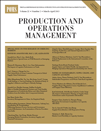Effect of Quality Management Systems and Total Quality Management on Productivity Before and After: Empirical Evidence from the Indian Auto Component Industr

We study the linkages between firm-level quality initiatives such as quality management systems (QMS) and total quality management (TQM) and output productivity in the Indian auto component industry. We use externally validated quality certification and quality awards as proxies for QMS and TQM, respectively, as it is difficult to directly measure the QMS and TQM efforts of firms. We use an unbalanced panel of 220 firms and a balanced panel of 73 firms from the Indian auto component industry over the period 1993-2006 to study these links. Both parametric as well as non-parametric approaches are used, as appropriate, to measure the rate of change in productivity and the impact of quality initiatives on productivity change during this period. We determine the proportion of productivity resulting from technical change and relative efficiency change, thus providing insights into the structure of productivity improvements. We find that TQM efforts resulted in a high rate of productivity change (11%) in the award-winning firms after the award. On the other hand, pre-certification productivity change due to QMS was 5% and post-certification change was 3.6%. In the periods prior to certification, productivity change was driven mainly by technical change; whereas the source of productivity change after certification is mixed. However, prior to awards, productivity change was driven mainly by relative efficiency change, whereas post-award productivity change was due to technical change. The results suggest that management focus on attaining certification did generate conceptual learning (linked to technical change) during the period leading to certification, but these effects were not significant after certification. The results also suggest that the TQM programs generated significant productivity gains in the long run, although setting the associated systems in place did not result in significant productivity change prior to winning awards. Thus, the study provides direct but nuanced evidence linking quality certification as well as the adoption of TQM programs to the associated conceptual and operational learning processes and their impact on the change in productivity.
Effect of Quality Management Systems and Total Quality Management on Productivity Before and After: Empirical Evidence from the Indian Auto Component Industr

We study the linkages between firm-level quality initiatives such as quality management systems (QMS) and total quality management (TQM) and output productivity in the Indian auto component industry. We use externally validated quality certification and quality awards as proxies for QMS and TQM, respectively, as it is difficult to directly measure the QMS and TQM efforts of firms. We use an unbalanced panel of 220 firms and a balanced panel of 73 firms from the Indian auto component industry over the period 1993-2006 to study these links. Both parametric as well as non-parametric approaches are used, as appropriate, to measure the rate of change in productivity and the impact of quality initiatives on productivity change during this period. We determine the proportion of productivity resulting from technical change and relative efficiency change, thus providing insights into the structure of productivity improvements. We find that TQM efforts resulted in a high rate of productivity change (11%) in the award-winning firms after the award. On the other hand, pre-certification productivity change due to QMS was 5% and post-certification change was 3.6%. In the periods prior to certification, productivity change was driven mainly by technical change; whereas the source of productivity change after certification is mixed. However, prior to awards, productivity change was driven mainly by relative efficiency change, whereas post-award productivity change was due to technical change. The results suggest that management focus on attaining certification did generate conceptual learning (linked to technical change) during the period leading to certification, but these effects were not significant after certification. The results also suggest that the TQM programs generated significant productivity gains in the long run, although setting the associated systems in place did not result in significant productivity change prior to winning awards. Thus, the study provides direct but nuanced evidence linking quality certification as well as the adoption of TQM programs to the associated conceptual and operational learning processes and their impact on the change in productivity.
